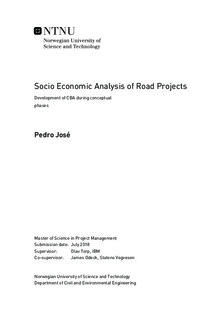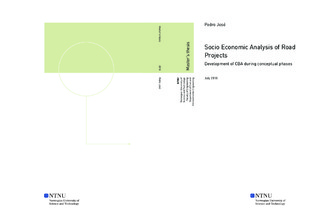| dc.description.abstract | A Socio Economic Analysis (SEA) is a complex and multidisciplinary assessment that evaluates the costs and benefits that a road project will create for the society. In Norway, it is performed in an early stage of a road project and it is comprised of two main processes, namely, conceptual study (KVU) and external quality assurance of conceptual study (KS1). Essentially, both processes have the same goal that is to assess the possible road project alternatives in terms of monetised and non-monetised impacts. However, the results from both processes can vary significantly, especially in terms of non-monetised impacts, raising thus questions regarding the method of assessment used and ultimately, the selection process of the assessed alternatives.
In this regard, this study aimed to address the differences in monetized results for both KVU and KS1 processes in an early stage of Norwegian road projects. This was done by assessing the reported key performance indicators (KPIs) of a total number of 26 road projects developed in Norway, as well as by performing in-depth interviews with a significant number of project managers from both public and private sectors. In addition, this study aimed to address possible changes that could be made to prevent the variation of results, leading consequently to an improved SEA process.
According to study findings, the interest rate and period of analysis are the main causes of variation between KVU and KS1 process results. In addition, it was found out that toll charges also play an important role in the variation of results. In this sense, an interest rate of 4% and a period of analysis of 40 years were suggested to be applied to road projects towards a more standardized process and hence towards a more transparent and better selection process of road project alternatives. Regarding the toll charges it was suggested that it should not be considered if its use is only focused on project s funding, as it might affect its scope. Regarding the assessment of the different alternatives, it was found out that alternative zero has associated a high level of subjectivity. In this sense, it was suggested that criteria to define the scale of investment considered in the alternative zero should be applied to avoid misunderstandings in the process selection by the Norwegian government. Furthermore, it was found out that that in some cases neither the KVU nor KS1 suggested alternative were considered in the selection process by the decision-makers, but rather one of the other assessed alternatives.
All in all, according to study findings it was concluded that there is a significant discrepancy between KVU and KS1 process results, and that the suggestions made throughout the study might help in the standardization of both processes. Nevertheless, it was also concluded that a further analysis is required and in such analyse more focus should be given to the decision-making process. | |

